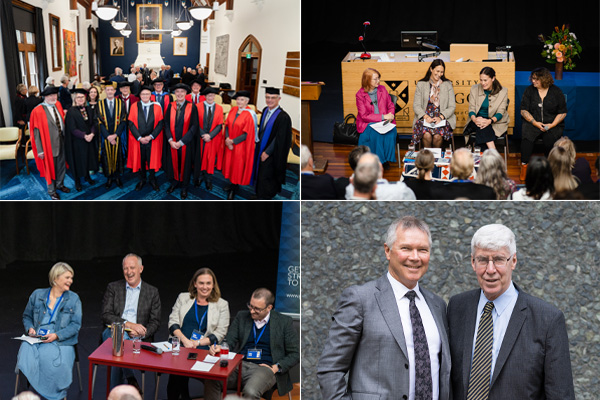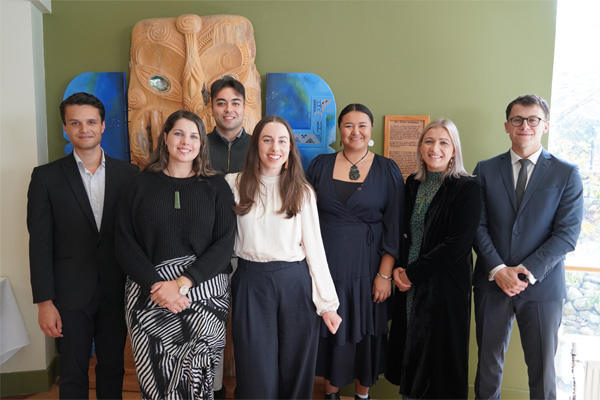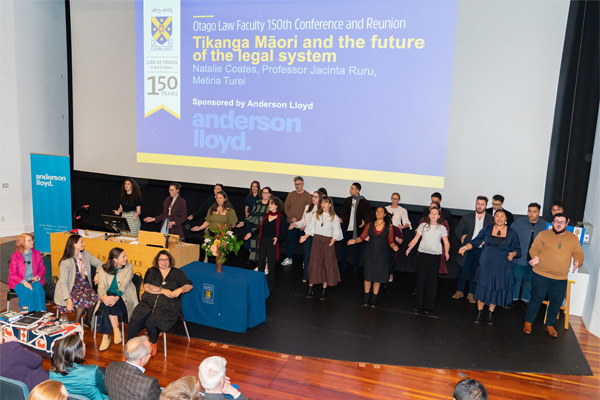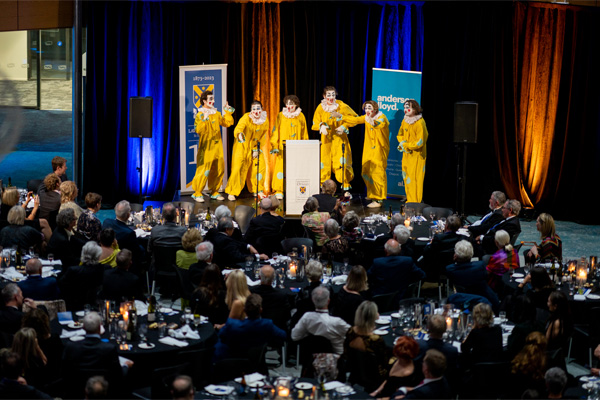
Law faculty hosts, alumni and guests from across Aotearoa New Zealand and around the globe recently gathered for three days of reminiscing, reuniting, and sharing legal expertise and insights at University of Otago Law celebrations.
Ka mua, ka muri: Celebrating 150 years of Law at the University of Otago, and the Te Roopū Whai Pūtake Otago Māori Law Students' Association 30th anniversary reunion, saw alumni, staff, students and guests descend on Dunedin for a wide-ranging programme of conference sessions, panel discussions, and opportunities to catch up with classmates, old friends and faculty.
The Law 150th conference and reunion attendees travelled from as far afield as the United States, Canada, Chile, Australia, Hong Kong, the UK, Ireland, Singapore and Malaysia for the sesquicentennial event, with around 380 attending across the two days.
“The celebrations, which began with Te Roopū Whai Pūtake's 30th reunion, ended in Seminar Room 5 on the following Monday evening, with a session between some of our most distinguished alumni, three Court of Appeal judges, and some of our newest law students from the second-year class, as well as finalists and Faculty staff,” says Dean of Law, Professor Shelley Griffiths.
All the judges at the Court of Appeal bench sitting in Dunedin on Monday were Otago graduates, and Professor Griffiths says the final Q&A seminar was a chance to create connection and close the circle between leaders in the profession and some students in the second month of their legal journey.
“The whole weekend was a wonderful reminder of what we remain committed to in the Faculty of Law: the focus on excellence in legal education within a community in which there is commitment to connection and diversity in many forms.
“We begin the next 150 years warmed by the enthusiasm and joy that our alumni showed when they returned for three very special days.”
Law 150th conference and reunion organiser, Professor John Dawson, says there was a fantastic turnout of Otago graduates, from across seven decades.
“The mix of serious intellectual material, lighter-hearted sessions and social events was very well-received. After COVID shutdowns, it was a most welcome opportunity to gather. The affection shown by graduates for the faculty and the University was palpable.
“We were able to showcase developments in the law, the legal curriculum and the student body, and celebrate the enormous contribution made by our graduates, over a long period, to the New Zealand legal system. We are delighted with the whole event and very grateful to our sponsors.”

Te Roopū Whai Pūtake 30th reunion
Celebrations began on Thursday 13 April, with a whakatau and kai at Te Tumu for the Te Roopū Whai Pūtake reunion, followed by a panel session on the history of the association. In the evening, the group was hosted at Ōtākou Marae, with Her Honour Judge Rachel Parata Mullins as keynote speaker. (Her Honour Judge Mullins was Te Roopū Whai Pūtake Tumuaki/President from 2000 to 2002). On Friday, Te Roopū Whai Pūtake held a panel discussion with recipients of Jolene Patuawa-Tuilave Māori Leadership in Law Scholarships sharing their experiences and reflecting on the legacy of the much admired and loved Jolene Patuawa-Tuilave.
Te Roopū Whai Pūtake Reunion Kōmiti/Committee member Paula Wilson says the highlight of the celebration for her was, “He tangata, he tangata, he tangata – catching up with my 'university' whānau, some of whom I had not seen in person for over 20 years. And also meeting and being inspired by the younger alumni and tauira/students coming through the Law School. For us as Te Roopū Whai Pūtake Māori Law Students, we are all a part of a bigger picture, walking in the footsteps of those gone before us”.
“The reunion was a chance to take a breath and reflect on how far we have come. For example, in 1995 when I was a law student in the Laws 101 Legal History paper there was no mention of Te Tiriti/Treaty of Waitangi. However, a whole generation later all law students at Otago have the opportunity to learn about Te Tiriti/Treaty of Waitangi, Aotearoa New Zealand's rich Te Ao Māori legal history, tikanga and te ture/the law under the academic guidance of Professor Jacinta Ruru, Metiria Turei and Mihiata Pirini. A huge mihi to our Founding President/Tumuaki Kristen Maynard ((Rongowhakaata, Ngati Porou, Ngati Kahungunu ki Wairoa, Ruapani) for her vision and strength in establishing Te Roopū Whai Pūtake) all those years ago.”
Paula says it was especially a privilege to be able to go back to Ōtākou Marae and spend time with the hau kainga/home people at the Marae. “E mihi maioha mātou ki Ōtākou Marae mō tō koutou manaakitanga – we are very grateful to Ōtākou Marae.”
She also thanked Carl Church and his recruitment company Niche Recruitment, which provided generous support to enable their reunion to go ahead. Professionally, Carl mentors and supports Māori in navigating their careers across a range of professions.
“E te tuakana e Carl ki te kore koe horekau ka tū tō mātou hui, anei rā tō mātou mihi maioha ki a koe mō tō tautoko i te ao, i te pō. Mā te huruhuru ka rere te manu – with feathers the bird can fly. Without the support of our tuakana Carl Church (Kai Tahu, proud Otago Law School graduate class of 1999) we would not have been able to gather.”
An Honorary Doctor of Laws and a warm welcome
On Friday morning, at a special ceremony in the University Council Chambers, an Honorary Doctor of Laws degree was conferred on eminent Canadian law professor and Otago alumnus Emeritus Professor Don McRae CC, ONZM, FRSC. In a veritable who's-who of the New Zealand legal profession, other Honorary Doctor of Laws recipients, including Dame Silvia Cartwright ONZ, PCNZM, DBE, QSO, DStJ, Sir Bruce Robertson KNZM and former Chancellor Dr Royden Somerville KC, donned their red cloaks and hats to welcome the latest addition to their ranks.
Professor McRae says his understanding of the role law plays in the major issues of our lives, as individuals, communities, states and nations, and the work he has gone on to achieve in his own career, all started at Otago.
“The world has undergone great change since my days at Otago. What I do now bears little relationship to what I studied at law school; international trade law did not exist as a discipline. But what I gained from Otago was the foundation for what is critical in legal thinking, in legal analysis.”
He says he is proud not only to receive recognition from his own law school and university, but to be receiving it from a law school at the forefront of progress in addressing inequities in legal education and in our society.
Before the official opening, the first Dean of the Law School, the late Professor Frank Guest, was honoured at a lunch for his former students. Professor Guest was also remembered often as an inspiration and major influence by speakers during the weekend. In the 'Life and times of the Otago Law Faculty' session, former Mayor of Dunedin Peter Chin CNZM, who attended Professor Guest's first Legal Systems class in 1960, said of his lecturers at the time, “by far the most interesting, stimulating and challenging lecturer was Professor Guest in Torts and Jurisprudence”. Professor McRae said Professor Guest was core to his legal education at Otago and had a profound influence on him and his career.
The official Mihi Whakatau and opening of the 150th celebrations in the afternoon began with a karakia from Kaitohutohu Māori Hata Temo, which was followed by a waiata from Te Roopū Whai Pūtake.
Dean of Law Professor Shelley Griffiths welcomed guests to the celebrations and Attorney-General, Hon David Parker, reflected on his time at Otago in the late 1970s and early 80s, sharing anecdotes of student life, lecturers, the establishment of the Dunedin Community Law Centre and noting just a few of Otago's distinguished Law academics and alumni.
“Many will recall the excitement of our first days here as, with trepidation, we engaged in the learning of the law. Lecturers with brains the size of Brazil dazzled us with their knowledge, sometimes sporting cool leather jackets, but perhaps more often showing greater flair in words than jeans.
“Here we are years later to reflect on the important role the Faculty has played in analysing, teaching, and shaping the law,” he said.
“We all carry with us what we learned here. This institution – which is the sum of its people over the last 150 years – has helped shape us, and through us the countries we live in.”

Conference insights and new innovation fund
New York University School of Law professor and renowned legal and political philosopher, Otago alumnus Professor Jeremy Waldron spoke to a packed lecture theatre in the first conference session. He addressed the topic of 'The Crisis of Judicial Review', with observations about the reputation of the judiciary in the United States and Israel.
A panel on Tikanga Māori and the future of the legal system was chaired by Annis Somerville, a former District and Family Court Judge, who held discussions with Professor Jacinta Ruru MNZM and Metiria Stanton Turei from the Law Faculty, and Natalie Coates a partner of Kāhui Legal.
Topics included the Supreme Court Ellis proceedings, in which Natalie Coates was counsel, concerning the relevance of tikanga to whether an appeal can continue beyond death; developing tikanga within the legal education curriculum; and the growing recognition that tikanga Māori has within it a dynamic legal system that precedes, and must be enabled to sit alongside and be part of New Zealand's formal state legal system.
Conference sessions for the day wrapped up with the 'Life and Times of the Otago Law Faculty', featuring alumni and faculty Peter Chin, Fiona Mackenzie, Graeme Todd, Sally McMillan, Judge Michael Mika, Sally McKechnie, Alex Latu and Yasmin Olsen, reflecting on their time at Otago, from the 1960s to today.
Saturday's sessions began with 'Thoughts from bench and bar' presented by Sir Ron Young KNZM and Fiona Guy Kidd KC. This was followed by the launch of the Law Dean's Innovation Fund, which aims to support and improve student experience by empowering leadership with the ability to fund ongoing and evolving needs and initiatives for students.
At the launch, Pro-Vice-Chancellor Humanities and former Dean of Law, Professor Jessica Palmer thanked the alumni community for its support over the years.
“I want to say a huge thank you to those of you in this audience and our broader alumni community who have for years supported us in all sorts of ways, not just financially . . . you've been there for our students, whether it's welcoming them to your offices and cities and towns or whether it's being here to help us judge competitions, or to come and speak to our students to offer your own experiences. All of these things are incredibly important to us,” says Professor Palmer.
“It's wonderful to see so many alumni who have gone on to do some incredible things. At the end of the day, I think it's really clear amongst all of us that we absolutely believe that the law matters and the rule of law matters and our role at the beginning of their career is to help them [our students] understand that. To help them to see that they can go on and make a huge difference.”

The event's two main sponsors, Dunedin legal firms Anderson Lloyd and Gallaway Cook Allan, have made significant contributions to launch the new Fund. They also provided generous support for the weekend's events, with Gallaway Cook Allan sponsoring the Cocktail Party and Dinner by the Decades and Anderson Lloyd sponsoring Gala Dinner. McMillan&Co sponsored the Saturday lunch.
“This event couldn't have been as successful as it was without the wonderful and very generous sponsorships we received from a number of law firms. We're very grateful for their support and we look forward to ongoing engagement with the University,” says the Director of the Development and Alumni Relations Office, Shelagh Murray.
Saturday's conference sessions continued with Justice Christine French and Justice Forrie Miller presenting 'Appearing before the Privy Council and the impact of the new Supreme Court'.
The final session, 'Sport, law and alternative careers' provided engaging insights on the world of sports agents and sports law from Warren Alcock and Maria Clarke, and reflections on combining law practice, playing rugby and writing plays from Foreskin's Lament playwright and former All Black trialist Greg McGee.
There wasn't a spare seat in the house for the closing event of the weekend – the staff vs former students debate. Addressing the motion 'Otago's best days are yet to come', alumni took the negative stance, reminiscing on their student days, while faculty upheld the notion the future has never looked better. The moderator decided on a “noise-o-meter” method for the judging, but it was too close to call and in the end no judgement was brought down on the two teams.
*Honorary Doctor of Laws recipient Emeritus Professor Don Macrae (centre), at the ceremony in the University Council Chambers, with, from left; Sir Bruce Robertson, Dean of Law Professor Shelley Griffiths, Pro-Vice-Chancellor Humanities Professor Jessica Palmer, Chancellor Stephen Higgs, Dr George Davis, Professor McRae, Professor Hugh Campbell, Deputy-Vice-Chancellor (Research and Enterprise) Professor Richard Blaikie, Professor John Dawson, Dr Royden Somerville KC, Dame Silvia Cartwright, President NZ Law Society Frazer Barton.
Kōrero by Margie Clark, Communications Adviser Development and Alumni Office
